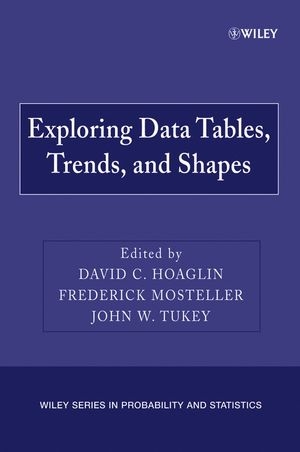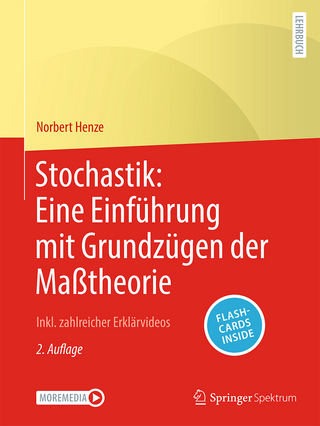
Exploring Data Tables, Trends, and Shapes
Wiley-Interscience (Verlag)
978-0-470-04005-8 (ISBN)
"Exploring Data Tables, Trends, and Shapes (EDTTS) was written as a companion volume to the same editors' book, Understanding Robust and Exploratory Data Analysis (UREDA). Whereas UREDA is a collection of exploratory and resistant methods of estimation and display, EDTTS goes a step further, describing multivariate and more complicated techniques . . . I feel that the authors have made a very significant contribution in the area of multivariate nonparametric methods. This book [is] a valuable source of reference to researchers in the area."
—Technometrics
"This edited volume . . . provides an important theoretical and philosophical extension to the currently popular statistical area of Exploratory Data Analysis, which seeks to reveal structure, or simple descriptions, in data . . . It is . . . an important reference volume which any statistical library should consider seriously."
—The Statistician
This newly available and affordably priced paperback version of Exploring Data Tables, Trends, and Shapes presents major advances in exploratory data analysis and robust regression methods and explains the techniques, relating them to classical methods. The book addresses the role of exploratory and robust techniques in the overall data-analytic enterprise, and it also presents new methods such as fitting by organized comparisons using the square combining table and identifying extreme cells in a sizable contingency table with probabilistic and exploratory approaches. The book features a chapter on using robust regression in less technical language than available elsewhere. Conceptual support for each technique is also provided.
DAVID C. HOAGLIN, PhD, is a Fellow of the American Statistical Association. FREDERICK MOSTELLER, PhD, has been the recipient of several honorary degrees and is a former President of the American Statistical Association. JOHN W. TUKEY, PhD, has received the National Medal of Science as well as several honorary degrees.
1. Theories of Data Analysis: From Magical Thinking Through Classical Statistics 1
Peris Diaconis 1A. Intuitive Statistics—Some Inferential Problems 4
IB. Multiplicity—A Pervasive Problem 9
1C. Some Remedies 12
ID. Theories for Data Analysis 22
IE. Uses for Mathematics 29
IF. In Defense of Controlled Magical Thinking 31
2. Fitting by Organized Comparisons: The Square Combining Table 37
Katherine Godfrey
2A. Combining Comparisons 37
2B. Two-Way Tables 39
2C. Paired Comparisons 47
2D. Analyzing Tables Containing Holes 49
2E. Summary 61
3. Resistant Nonadditive Fits for Two-Way Tables 67
John D. Emerson and Gregory Y. Wong
3A. The Simple Additive Model and Median Polish 68
3B. One Step Beyond an Additive Fit 71
3C. Assessing and Comparing Fits 79
3D. Multiplicative Fits 83
3E. Techniques for Obtaining Simple Multiplicative Fits 92
3F. Additive-Plus-Multiplicative Fits 100
3G. Some Background for Nonadditive Fits 113
3H. Summary 117
4. Three-Way Analysis 125
Nancy Cook
4A. Structure of the Three-Way Table 126
4B. Decompositions and Models for Three-Way Analysis 128
4C. Median-Polish Analysis for the Main-Effects-Only Case 130
4D. Nonadditivity and a Diagnostic Plot in Main-Effects-Only Analysis 145
4E. Analysis Using Means 158
4F. Median-Polish Analysis for the Full-Effects Case 164
4G. Diagnostic Plots for the Full-Effects Case 176
4H. Fitting the Full-Effects Model by Means 180
4I. Computation, Other Polishes, and Missing Values 182
4J. Summary 183
5. Identifying Extreme Cells in a Sizable Contingency Table: Probabilistic and Exploratory Approaches 189
Frederick Mosteller and Anita Parunak
5A. The Hypergeometric Distribution 192
5B. Assessing Outliers 195
5C. The Simulation Approach 199
5D. Applying the Simulation Approach to the Table of Archaeological Data 206
5E. An Exploratory Approach, Based on Deviations from Independence 212
5F. A Logarithmic Exploratory Approach 214
5G. Illustrations of the New Standardization 217
5H. Summary 221
51. Conclusion 223
6. Fitting Straight Lines By Eye 225
Frederick Mosteller, Andrew F. Siegel, Edward Trapido, and Cleo Youtz
6A. Method 226
6B. Results 229
6C. Summary 238
7. Resistant Multiple Regression, One Variable at a Time 241
John D. Emerson and David C. Hoaglin
7A. Resistant Lines 242
7B. Sweeping Out 246
7C. Example 250
7D. When Carriers Come in Blocks 263
7E. Summary 273
8. Robust Regression 281
Guoying Li
8A. Why Robust Regression? 282
8B. M-Estimators and W-Estimators for Regression 291
8C. Computation 304
8D. Example: The Stack Loss Data 310
8E. Bounded-Influence Regression 322
8F. Some Alternative Methods 328
8G. Summary 335
9. Checking the Shape of Discrete Distributions 345
David C. Hoaglin and John W. Tukey
9A. A Poissonness Plot 348
9B. Confidence Intervals for the Count Metameter 358
9C. When Is a Point Discrepant? 370
9D. Overall Plots for Other Families of Distributions 376
9E. Frequency-Ratio Alternatives 389
9F. Cooperative Diversity 396
9G. Double-Root Residuals 406
9H. Summary 409
10. Using Quantiles to Study Shape 417
David C. Hoaglin
10A. Diagnosing Skewness 419
10B. Diagnosing Elongation 425
IOC. Quantile-Quantile Plots 432
10D. Plots for Skewness and Elongation 442
10E. Pushback Analysis 450
10F. Summary 454
10G. Appendix 456
11. Summarizing Shape Numerically: The g-and-h Distributions 416
David C. Hoaglin
11 A. Skewness 462
11B. Elongation 479
11C. Combining Skewness and Elongation 485
11D. More General Patterns of Skewness and Elongation 490
HE. Working from Frequency Distributions 496
11F. Moments 501
11G. Other Approaches to Shape 504
11H. Summary 508
Index.
| Reihe/Serie | Wiley Series in Probability and Statistics |
|---|---|
| Sprache | englisch |
| Maße | 157 x 239 mm |
| Gewicht | 710 g |
| Themenwelt | Mathematik / Informatik ► Mathematik ► Wahrscheinlichkeit / Kombinatorik |
| ISBN-10 | 0-470-04005-X / 047004005X |
| ISBN-13 | 978-0-470-04005-8 / 9780470040058 |
| Zustand | Neuware |
| Haben Sie eine Frage zum Produkt? |
aus dem Bereich


